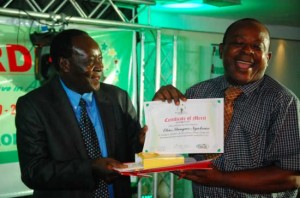Walter Wilson Nana
Buea, Cameroon.
Elias Ntungwe Ngalame who writes for the Thomson Reuters Foundation and Cameroonian bi-weekly tabloid, EDEN, emerged the best-in-print category during the first-ever journalism awards focusing on climate change in Africa.
The African Climate Change and Environment Reporting, ACCER awards, announced at a gala evening in Nairobi on Thursday, June 5 2013 were organised by the Pan African Climate Justice Alliance, PACJA, in collaboration with the United Nations Environment Program, Agenda Kenya and other partners.

Dr Wilbur Ottichilo, environment scientist and a Kenya Member of Parliament hands over a certificate and other prizes to Elias Ntungwe (right) during a gala night in Nairobi.
According to Isaiah Isipisu of Thomson Reuters Foundation, Elias Ntungwe Ngalame from Cameroon was named African climate change print journalist of the year, with an article titled; ‘Community radio helps Cameroonians track climate change’.
Trailing the Cameroonian were Danstan Kaunda, a Zambian reporting from Zanzibar, with an article titled; ‘Warming seas frustrate Zanzibar seaweed farmers’ and the third prize went to Mwadalitso Mwando of Zimbabwe with an article titled: ‘Rural Zimbabwe struggle to cope with flooding.’
The three winning print articles coincidentally were from reporters of the Thomson Reuters Foundation. They were selected from 147 entries from different publications, all communicating issues related to climate change on the African continent.
According to the judges, the winning print article by Ntungwe Ngalame was an excellent example of environmental journalism. It demonstrated how a community can employ live radio not only for monitoring daily weather changes, but to help people adapt to climate shifts and more extreme weather.
“This writer transports you to Cameroon, where you find yourself not just reading the piece, but also virtually listening to radio,” said Barrack Muluka, who headed the team of six independent judges.
Apart from receiving a $1,000 cash prize (FCFA 500,000), Ngalame won an all-expenses-paid travel grant to attend and report on the forthcoming 19th Conference of Parties (COP 19) climate negotiations in Poland in November 2013.
“This is a surprise. I did not expect it. It will be a privilege for me to cover a Conference of Parties and discover Poland,” said Ngalame who has been practicing journalism for more than fifteen years.
The Cameroonian journalist was also elected Central African coordinator for the newly created Pan African Media Alliance for Climate Change, PAMACC, a network of journalists reporting on climate change issues in Africa. He will be coordinating activities of the network under the umbrella of the Pan African Climate Justice Alliance, PACJA and help bring journalists reporting on climate change from Gabon, Central African Republic, Equatorial Guinea, Democratic Republic of Congo, Congo-Brazza, Tchad and Cameroon together for a common course.
Mithika Mwenda, the Secretary General of PACJA, said the awarding event will be held every year to encourage journalists to write more articles on climate change and related issues. “We would like this to become the most prestigious media award in Africa,” he added, while congratulating the winners from both the print and broadcast categories.
In making their decisions, the judges were concerned with both form and content for all the categories. “We were looking out for a write-up that showed clear understanding of the fundamental issues on the discourse on the environment and climate change,” Mwenda said. He will add; “The judges also wanted winning articles to show what climate change means for Africa, and what the people of Africa can do about it or are doing about it. This included policy issues, adaptation measures, mitigation and any form of intervention on the ground.”
Other winners in the broadcast category were Peter Labeja of Uganda who emerged the best in that group. He was followed by Pius Sawa of Kenya and Adu Domfey Kofi of Ghana.
The Pan African Climate Justice Alliance is a continental coalition of civil society organizations in Africa, brought together by a common goal of promoting and advocating for climate-friendly and equity-based development. Currently drawing its membership from 300 non-governmental organizations, foundations, trusts, community-based organizations, faith-based networks, national coalitions and regional networks from 45 countries in Africa, PACJA aims to unify isolated civil society efforts on climate change advocacy and coordination in Africa, so as to ensure that pro-poor and people-centred response measures are put into consideration as governments in Africa seek to mainstream climate change into national development strategies.



